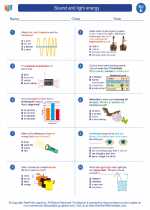Terrestrial Ecosystems
Terrestrial ecosystems are land-based ecosystems that are characterized by the presence of plants, animals, and microorganisms. These ecosystems can vary widely in size and complexity, ranging from a small patch of grassland to a vast tropical rainforest. Terrestrial ecosystems play a crucial role in maintaining the balance of the Earth's environment and are home to a diverse array of species.
Components of Terrestrial Ecosystems
The main components of terrestrial ecosystems include:
- Producers: Plants and other photosynthetic organisms that convert sunlight into energy through the process of photosynthesis.
- Consumers: Animals that feed on the producers or other consumers.
- Decomposers: Microorganisms such as bacteria and fungi that break down dead organic matter, returning nutrients to the soil.
- Abiotic Factors: Non-living components such as soil, water, sunlight, temperature, and climate that influence the ecosystem.
Types of Terrestrial Ecosystems
There are several types of terrestrial ecosystems, each with its own unique characteristics:
- Forests: Dense areas of trees and vegetation, such as tropical rainforests, temperate forests, and boreal forests.
- Grasslands: Areas dominated by grasses and herbaceous plants, such as prairies and savannas.
- Deserts: Dry and arid regions with sparse vegetation and extreme temperature fluctuations.
- Tundra: Cold and treeless landscapes found in polar regions, characterized by permafrost and low-growing vegetation.
- Mountains: High-altitude ecosystems with diverse microclimates and distinct flora and fauna.
Importance of Terrestrial Ecosystems
Terrestrial ecosystems provide a wide range of ecosystem services that are essential for the well-being of both natural environments and human societies. These services include:
- Carbon Sequestration: Plants and soil in terrestrial ecosystems help regulate the Earth's climate by absorbing carbon dioxide from the atmosphere.
- Biodiversity: Terrestrial ecosystems support a vast array of plant and animal species, contributing to global biodiversity and genetic diversity.
- Soil Formation and Nutrient Cycling: Ecosystem processes within terrestrial environments contribute to the formation of soil and the recycling of essential nutrients.
- Water Regulation: Terrestrial ecosystems play a role in regulating water flow, reducing erosion, and maintaining water quality.
Human Impact on Terrestrial Ecosystems
Human activities such as deforestation, urbanization, agriculture, and pollution have significantly impacted terrestrial ecosystems. It is important to understand and mitigate these impacts to preserve the integrity and functionality of these ecosystems for future generations.
Study Guide
Here are some key points to remember when studying terrestrial ecosystems:
- Define the components of terrestrial ecosystems and explain their interrelationships.
- Describe the characteristics of different types of terrestrial ecosystems and the species that inhabit them.
- Discuss the importance of terrestrial ecosystems and the ecosystem services they provide.
- Analyze the impact of human activities on terrestrial ecosystems and propose solutions to address these challenges.
◂Science Worksheets and Study Guides Fifth Grade. Sound and light energy

 Activity Lesson
Activity Lesson
 Worksheet/Answer key
Worksheet/Answer key
 Worksheet/Answer key
Worksheet/Answer key
 Worksheet/Answer key
Worksheet/Answer key
 Worksheet/Answer key
Worksheet/Answer key
 Vocabulary/Answer key
Vocabulary/Answer key
 Vocabulary/Answer key
Vocabulary/Answer key
